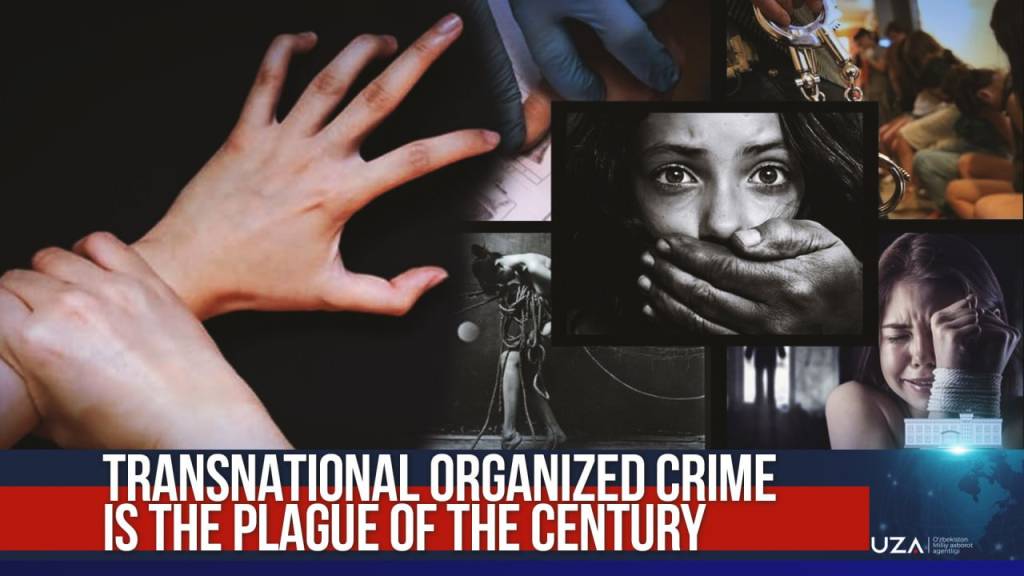
Transnational organized crime, which has long been associated with drug, human, and firearms trafficking, is a severe threat to security and stability not only at the national, but also at the regional and even global levels. At the same time, it hinders the establishment of legitimacy in society, as well as social and economic development.
According to the UN, about 300 million people around the world use drugs, and the number of victims of human trafficking has exceeded 5 million in the last year. These problems are the focus of attention of Uzbekistan and many other countries.
Statistics show that in the last 5 years, the number of drug crimes in Uzbekistan has increased by almost 2 times, the confiscation of illegal drugs by 8.5 times, and the confiscation of synthetic drugs by 400 times.
It follows that it is essential to define careful measures and establish practical international cooperation to reduce the destructive effects of transnational crime.
To bring the fight against drug addiction and drug crimes to a new level in the country, for the first time in the country, the Decree of the President of the Republic of Uzbekistan of May 6, 2024 “National strategy for combating drug addiction and drug crimes in the Republic of Uzbekistan for 2024-2028” has been adopted.
In this process, the recommendations of the experts of the UN Office on Drugs and Crime, the International Narcotics Control Board, the Organization for Security and Co-operation in Europe, the International Anti-Corruption Academy, the German Foundation for International Legal Cooperation, and the best practices of more than 10 countries have been taken into account.
Today’s presentation event is being held in cooperation with the National Center and the UN Regional Office on Drugs and Crime in Afghanistan, Central Asia, Iran, and Pakistan as part of the International Day for the Prevention of and Fight against All Forms of Transnational Organized Crime on November 15.
The day highlights the importance of global solidarity in combating the threats of organized crime, which undermine progress towards peace, security, and sustainable development.
The event includes members of state and regional commissions for control over narcotic drugs and psychotropic substances, heads of official state bodies and organizations, representatives of 56 international partner organizations and diplomatic corps, and about 20 national and foreign media.
The participants of the event were shown the video addresses of the Director-General/ Executive Director of the United Nations Office at Vienna (UNOV)/ United Nations Office on Drugs and Crime (UNODC) Ms. Ghada Fathi Waly and the Director of the Central Asian Regional Information and Coordination Centre for Combating Illicit Trafficking of Narcotic Drugs, Psychotropic Substances and their Precursors (CARICC) Atageldi Yazlyyev.
Ms. Sabine Machl, the UN Resident Coordinator in Uzbekistan, Dr. Oliver Stolpe, the UNODC Regional Representative for Afghanistan, Central Asia, Iran and Pakistan, and Ravshan Mamatov, the Director of the National Narcotics Control Center under the Presidential Administration of the Republic of Uzbekistan, addressed the opening ceremony of the event.
In addition, Salome Flores Sierra, the Head of the UNODC Information Centre in Tashkent city, provided information about the situation in Afghanistan and the new trends and measures taken against transnational organized crime.
<iframe width="680" height="420" src="https://www.youtube.com/embed/uBlBkAjQhn4" title="The day highlights the importance of global solidarity in combating the threats of organized crime" frameborder="0" allow="accelerometer; autoplay; clipboard-write; encrypted-media; gyroscope; picture-in-picture; web-share" referrerpolicy="strict-origin-when-cross-origin" allowfullscreen></iframe>Musulmon Ziyo, video by Doniyor Yoqubov, UzA








